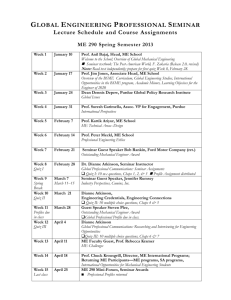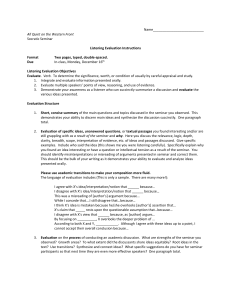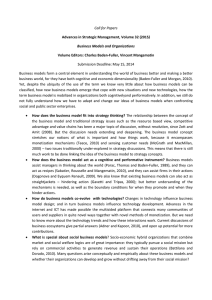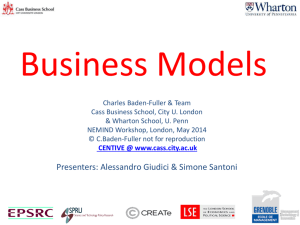4Q69, Seminar Four Business Models and Structural Choices
advertisement
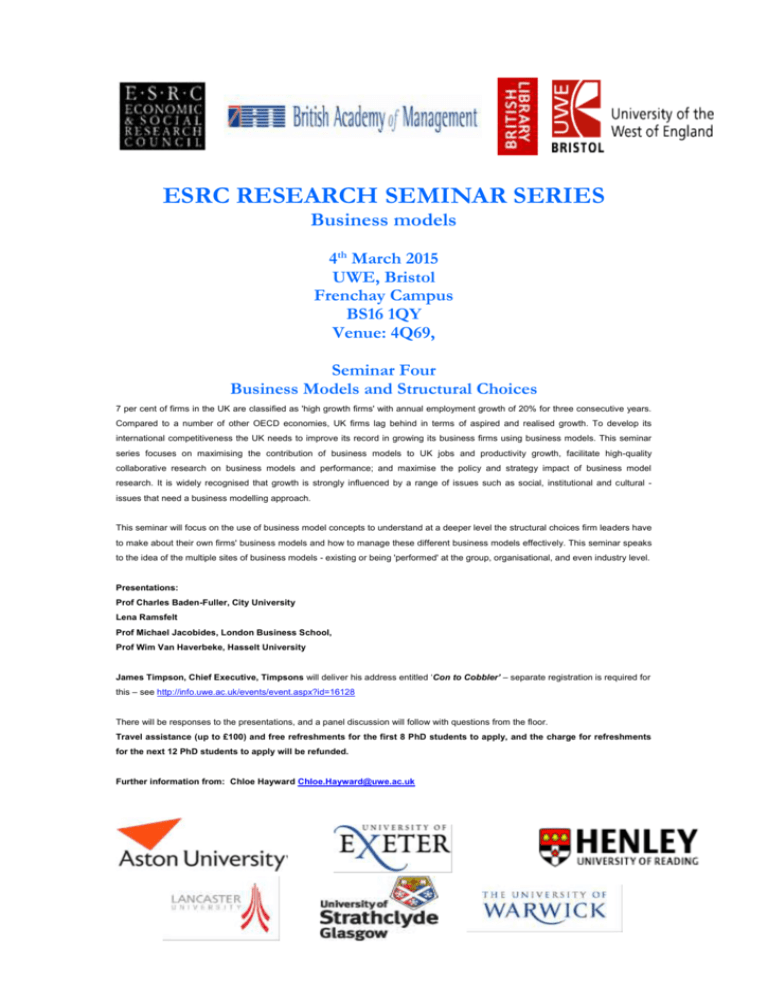
ESRC RESEARCH SEMINAR SERIES Business models 4th March 2015 UWE, Bristol Frenchay Campus BS16 1QY Venue: 4Q69, Seminar Four Business Models and Structural Choices 7 per cent of firms in the UK are classified as 'high growth firms' with annual employment growth of 20% for three consecutive years. Compared to a number of other OECD economies, UK firms lag behind in terms of aspired and realised growth. To develop its international competitiveness the UK needs to improve its record in growing its business firms using business models. This seminar series focuses on maximising the contribution of business models to UK jobs and productivity growth, facilitate high-quality collaborative research on business models and performance; and maximise the policy and strategy impact of business model research. It is widely recognised that growth is strongly influenced by a range of issues such as social, institutional and cultural issues that need a business modelling approach. This seminar will focus on the use of business model concepts to understand at a deeper level the structural choices firm leaders have to make about their own firms' business models and how to manage these different business models effectively. This seminar speaks to the idea of the multiple sites of business models - existing or being 'performed' at the group, organisational, and even industry level. Presentations: Prof Charles Baden-Fuller, City University Lena Ramsfelt Prof Michael Jacobides, London Business School, Prof Wim Van Haverbeke, Hasselt University James Timpson, Chief Executive, Timpsons will deliver his address entitled ‘Con to Cobbler’ – separate registration is required for this – see http://info.uwe.ac.uk/events/event.aspx?id=16128 There will be responses to the presentations, and a panel discussion will follow with questions from the floor. Travel assistance (up to £100) and free refreshments for the first 8 PhD students to apply, and the charge for refreshments for the next 12 PhD students to apply will be refunded. Further information from: Chloe Hayward Chloe.Hayward@uwe.ac.uk Seminar 4 4th March 2015 Bristol Business School PROGRAMME 09.30-10.00 Registration and Coffee 10.00 – 10:05 Welcome – Professor Noel Burchell, Pro Vice Chancellor and Executive Dean, 10:05 – 10:10 Introduction and outline of the day – Professor Nicholas O’Regan 10.10- 10.20 Summary of Seminar 3 Prof Jonathan Levie, Strathclyde 10.20 – 10.50 Prof Charles Baden-Fuller, City University Title of Presentation – Business Model Zoo, a tool kit to understanding business model choices 10.50 – Stewart Leinster, BaE Systems 11:30 Title of Presentation -From business models to business reality: the challenge of integrating the verticals 11:30 – 11.45 Coffee break 11.45 – Lena Ramsfelt – Stanford University and author of the bestselling book 12:25 Gear Up: Test Your Business Model Potential and Plan Your Path to Success 12:25 – 13:05 13:05 – 14.00 14.00 – 14:40 Title of Presentation - Sales Formula - point of departure for a unique business model Prof Michael Jacobides – London Business School Title of Presentation - Confronting the competitive and structural context of Business Models: Industry Architectures, Ecosystems, or Sectors? Lunch – Business Models: Structural Choices Prof Wim Van Haverbeke, Hasselt University Title of Presentation – Difficulties in framing Open Business Models" 14.40 – 15.20 15.20- 16.00 16.00 – 16.10 18.00-19.30 Business models and SMEs - tales from the coalface (with speakers to be confirmed). Business Models Research at UWE Bristol Dr Glenn Parry Prof Dylan Jones Evans Dr Peter Bradley Professor Andi Smart closing Remarks and invitation to re-convene at Exeter University for the fifth seminar, Business Models: An Activity System Perspective Exeter June 2015 James Timpson, Chief Executive, Timpsons* Further details Charles Baden-Fuller will present his business model zoo, a framework for understanding business model choices that is practically supported with exemplars drawn from across digital and non-digital industries. Stewart Leinster will discuss the challenges in vertical business integration. At the lower levels a number of concepts all promise benefits to customers (service consumers) and businesses, but service remains of a transactional nature. He will explore how can we innovate the service ecosystem from its current ‘Push’ configuration towards a ‘Pull’ configuration that is able to exploit the promise of IVHM/CBM? Stewart contends that there is a need to address the ‘vertical’ of the business stack – from the Service consumer, the contracting framework and incentivisation model right through to the data, analytics, and information services used as part of Service Delivery – they are all linked in transforming from a Push to a Pull model. His presentation is based on how this can be achieved Michael Jacobides will consider the analytical and definitional challenges of Business Models, and also suggest that we need to shift our attention from each particular firms' business model, to the competitive context in which the business is situated. Drawing on his current work on the comparative use of ecosystems, industry architectures, platforms or sectors as the level of analysis, he will consider how we can best anchor the Business Model discussion to a specific analysis of the competitive and structural context that surrounds them. He will conclude with the discussion of promising directions but also blind spots for business model research, and consider promises and potential challenges of a structural view. Lena Ramfelt will base her presentation on three fundamental concepts in order to develop a business model: Customer Acquisition, Delight, and Business Model. Those three entities creates what will be referred to as a "Sales Formula". It is in the interaction among the three that a company can build a unique Sales Formula that is hard to copy, is levering the value created, and is sustainable. James Timpson is Chief Executive of Timpson, a family retail business based in Manchester. Through 820 shops across the UK and Ireland Timpson is the largest shoe repairer, key cutter, engraver and watch repairer. Timpson's store portfolio was further increased by the purchase of 180 Max Spielmann photo processing stores in 2008 and an additional 121 Snappy Snap photo processing stores in 2013, boosting the Company's turnover to £200M. Recent acquisitions have seen the total store numbers exceed 1300. Over 3500 colleagues run the shops within an "upside down management" structure which Timpson has developed to ensure those serving customers are the most important colleagues in the business; everyone else is there to help them give amazing service. Coupled with this is a consistency on recruiting only those with amazing personalities. The Seminar Series is sponsored by the ESRC, BAM and the British Library, but a nominal charge of £25 will be made for administration/refreshments. There is travel assistance (up to £100) and free refreshments for the first 8 PhD students to apply, and the charge for refreshments for the next 12 PhD students to apply will be refunded.

